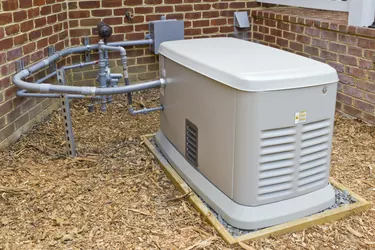
Whole-house gas generators can be lifesavers for homeowners. The cost varies depending on the size of the home and the type of generator. In 2021, the average installation cost for a whole house gas generator (diesel-powered) is $3,000-$15,000. They don't generate federal energy tax credits, but tax credits of other kinds, and even reimbursements, might be available to you depending on why you need to purchase a generator, where you live, and when you lived there.
Energy Tax Credits
Video of the Day
While the federal government doesn't provide energy tax credits for gas generators -- preferring to focus instead on renewable energy sources like wind and solar -- some states do. Since natural and propane gases burn cleaner than other fossil fuels, such as oil and coal, they reduce a home's carbon footprint. And because a gas generator can run as easily on biomass methane gas mined from decomposing landfill waste and other biological sources as it can from natural gas mined using traditional underground extraction, you might be eligible for an additional non-taxable state grant, subsidy, or tax credit if you choose that fuel source.
Video of the Day
Tax Incentives for Alternative Energy Equipment
According to the IRS, there are tax incentives for homeowners who installed the following alternative energy equipment starting in 2016. Tax incentives will be available on equipment installed until January 1, 2024.
- Fuel cell property
- Geothermal heat pumps
- Small wind turbines
- Solar electric property
- Solar water heaters
Residential Energy Property Credit for Homeowners
- For the tax years 2018, 2019, 2020, and 2021, eligible homeowners can claim a tax credit for:
- 10% of the "cost of qualified energy efficiency improvements"; and
- the amount the homeowner paid for residential energy property expenditures paid during the tax year, up to a maximum credit of $500.
Federal Tax Deductions for Medical Expenses
According to the Internal Revenue Service, if you itemize your tax deductions, you can deduct medical and dental expenses paid for yourself, your spouse, and your dependents. Only expenses that exceed 7.5 of your adjusted gross income are eligible. A generator purchased for medical needs is tax-deductible as a medical expense as long as you, or a family member who lives with you, has a documented medical condition that could become life-threatening if electrical power is lost.
Long-term Capital Gains and Whole-House Generators
Depending on the value of your home – and depending on how many homes you've deferred capital gains taxes on by purchasing a new one within the required time frame – you may still owe capital gains. If you sell a home and decide not to purchase another one, a whole-house generator would qualify as a capital improvement that might reduce your tax liability depending on the adjusted tax basis of your home.
Generator Reimbursements Due to Natural Disasters
The Federal Emergency Management Agency coordinates federal, state, and sometimes local responses to natural disasters, many of which result in massive and lengthy electrical power outages. FEMA has a generator reimbursement program to assist homeowners affected by disasters; it's not a tax credit, but a reimbursement. It begins when a state governor declares a disaster and ends on the date power is restored.
While FEMA provides grants to certain businesses for the purchase of standby generators, it doesn't do so for individuals and families. This program should allow you to receive reimbursement for the cost of a generator should a natural disaster occur where you live.